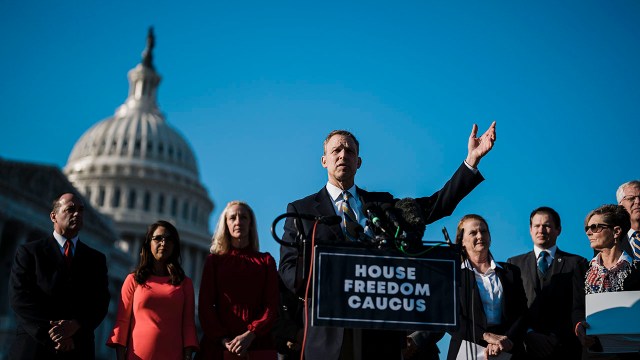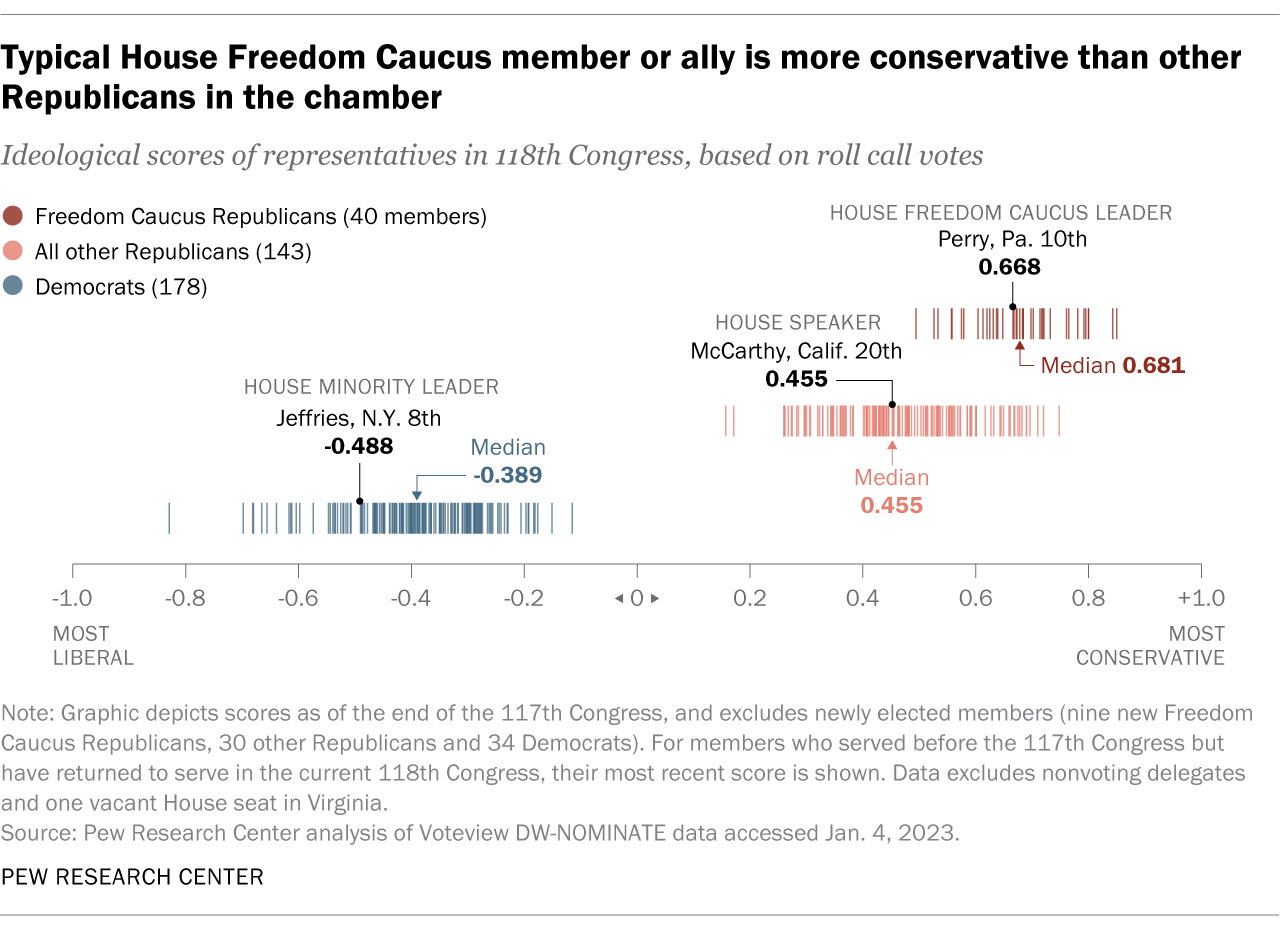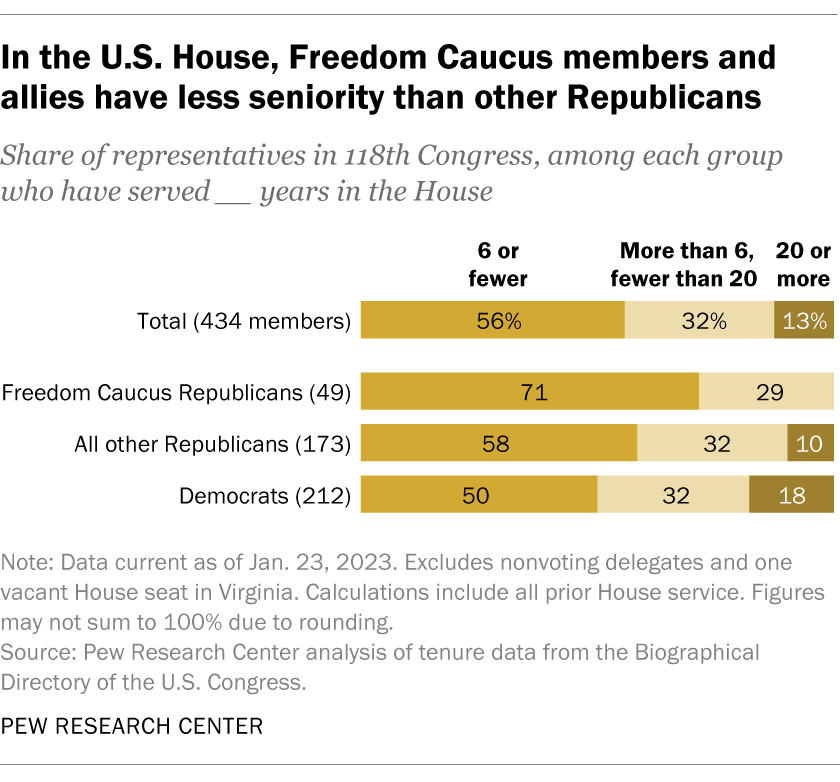
The 118th Congress hadn’t even officially gotten underway before the House Freedom Caucus began exercising its influence. Nearly all of the 20 or so Republican House members who threatened to torpedo Kevin McCarthy’s speakership bid belong to the Freedom Caucus or are closely aligned with it (though more than half of caucus members and allies did back McCarthy from the start).
McCarthy eventually won the speaker’s gavel on the 15th ballot, but not until he agreed to ensure more Freedom Caucus representation on the powerful Rules Committee and other key panels. McCarthy also agreed to a passel of rule changes long sought by the Freedom Caucus, many of them intended to shift power away from the speaker’s office and toward committee chairs and rank-and-file members.
Those changes, along with the narrow margin of Republican control of the House, make it likely we’ll be hearing a lot more about – and from – House Freedom Caucus members over the next two years. But just who are they?
Unlike most of the dozens of caucuses and single-issue groups on Capitol Hill, the Freedom Caucus doesn’t publicize its membership, which reportedly is by invitation only. However, Pew Research Center has identified 49 House members – 22% of the entire House GOP conference – who either belong to the Freedom Caucus or are closely aligned with it. (Read the “How we did this” box to learn how we identified members and allies.)
The Freedom Caucus, a group of three to four dozen representatives on the rightward flank of the House GOP conference, was founded in January 2015. It’s become known as much for its embrace of confrontation and controversy as for its conservative policy positions: It battled repeatedly with former Speaker John Boehner and blocked Kevin McCarthy’s earlier attempt to succeed Boehner after he quit the post. Members have supported shutting down the federal government and opposed raising the debt limit as hardball tactics in budgetary battles.
Unlike other congressional caucuses, the Freedom Caucus does not disclose an official member list, although 16 current members list their Freedom Caucus affiliations on their official House websites, and various unofficial lists have circulated. Membership is by invitation only, and meetings are not public. For those reasons, it can be hard to distinguish between representatives who belong to the caucus and those who work closely with it but aren’t full members.
Pew Research Center compiled its list from a variety of sources, including members’ websites, the 2022 endorsement list from the caucus-affiliated House Freedom Fund, and published reports from reputable news outlets. For each member, we sought confirmation from at least two unrelated sources before adding them to the list.
Data on members’ birthdates and dates in office was taken primarily from the online Biographical Directory of the United States Congress, supplemented by information compiled by CQ Roll Call. Data on members’ racial and ethnic backgrounds came from the Congressional Research Service. Data on which members voted to object to the certification of President Biden’s Electoral College win in January 2021 comes from The Washington Post.
The analysis also used a dataset called DW-NOMINATE to compare the ideologies of Freedom Caucus members and allies with those of other House Republicans in the 118th Congress. DW-NOMINATE assigns each representative a score ranging from -1 (most liberal) to +1 (most conservative) based on their roll call voting patterns. The scores are as of the end of the 117th Congress and exclude newly elected members (nine new Freedom Caucus Republicans, 30 other Republicans and 34 Democrats). For members who served before the 117th Congress but have returned to serve in the current 118th Congress, their most recent score is shown. This data was accessed Jan. 4, 2023.
All of the analysis in this post is based on a voting membership of 434 House members as of Jan. 23, 2023. Nonvoting delegates from the District of Columbia and five territories are excluded, as is a vacant House seat in Virginia.
Ideologically, Freedom Caucus members and allies are among the most conservative of House Republicans, with several falling on the rightmost end of the spectrum.
To quantify this, we used a dataset called DW-NOMINATE, first developed by political scientists Keith T. Poole and Howard Rosenthal in the early 1980s and refined and updated since. In simplified form, DW-NOMINATE assigns each representative a score ranging from -1 (most liberal) to +1 (most conservative), based on their roll call voting patterns. (Since the 73 freshmen members of the 118th House – i.e., those who were elected for the first time in the November 2022 midterms – don’t yet have voting records to analyze, they’re excluded from the ideological analysis below.)

The Freedom Caucus members and allies have a median DW-NOMINATE score of +0.681, substantially higher than the median for all other House GOP members (+0.455). The least conservative Freedom Caucus-aligned member, in fact, is still more conservative than the median non-Freedom Caucus House Republican. And 10 Freedom Caucus members are more conservative than the most conservative nonmember.
In January 2021, the Freedom Caucus was almost unanimous in opposing the certification of President Joe Biden’s victory over former President Donald Trump. Of the 40 current Freedom Caucus members and allies who were serving at that time, 38 supported at least one objection to counting Biden’s electoral votes. A smaller share of all other House Republicans seated at the time (about 60%) did so.

Freedom Caucus members and their allies also have spent decidedly less time in the House than other members of the GOP conference. Some 71% of the identified members and allies of the caucus (35 of 49) have served in Congress for six years or fewer, a count that includes nine freshmen. The longest-serving Freedom Caucus member, new House Judiciary Committee Chairman Jim Jordan of Ohio, is in his ninth term. By contrast, 58% of all other House Republicans (101 of 173) have spent six years or less in Congress, and 17 of them (10%) have served in the House for a total of 20 years or longer.
Freedom Caucus members and allies are more likely to come from the South than non-Freedom Caucus Republicans. Nearly two-thirds of the Freedom Caucus members and allies we identified (32 of 49) represent districts in the 16-state Southern region, as defined by the Census Bureau. That compares with 46% of all other House Republicans. Freedom Caucus members and allies are somewhat more likely than other House Republicans to be from the West, and less likely to be from the Midwest. Only one Freedom Caucus member, Chairman Scott Perry of Pennsylvania, comes from the Northeast.
Demographically, the Freedom Caucus group looks much like the rest of the House GOP. Only four members and allies (8.2%) identify as a different race or ethnicity than non-Hispanic White, compared with 9.8% of other House Republicans. Seven of the caucus and its associates (14.3%) are women, versus 15% of other House Republicans. And their average ages – 56.3 and 56.7, respectively – are almost identical.
118th Congress House Freedom Caucus members and allies
| State | District | Representative |
|---|---|---|
| AZ | 5 | Andy Biggs |
| NC | 8 | Dan Bishop |
| CO | 3 | Lauren Boebert |
| OK | 2 | Josh Brecheen |
| CO | 4 | Ken Buck |
| MO | 7 | Eric Burlison |
| VA | 6 | Ben Cline |
| TX | 27 | Michael Cloud |
| GA | 9 | Andrew Clyde |
| GA | 10 | Mike Collins |
| AZ | 2 | Eli Crane |
| OH | 8 | Warren Davidson |
| TN | 4 | Scott DesJarlais |
| FL | 19 | Byron Donalds |
| SC | 3 | Jeff Duncan |
| ID | 1 | Russ Fulcher |
| FL | 1 | Matt Gaetz |
| VA | 5 | Bob Good |
| AZ | 9 | Paul Gosar |
| TN | 7 | Mark Green |
| GA | 14 | Marjorie Taylor Greene |
| VA | 9 | Morgan Griffith |
| WY | At large | Harriet Hageman |
| MD | 1 | Andy Harris |
| TN | 1 | Diana Harshbarger |
| LA | 3 | Clay Higgins |
| TX | 13 | Ronny Jackson |
| LA | 4 | Mike Johnson |
| OH | 4 | Jim Jordan |
| AZ | 8 | Debbie Lesko |
| FL | 13 | Anna Paulina Luna |
| IL | 15 | Mary Miller |
| OH | 7 | Max Miller |
| WV | 2 | Alex Mooney |
| AL | 2 | Barry Moore |
| NC | 3 | Greg Murphy |
| TX | 22 | Troy Nehls |
| SC | 5 | Ralph Norman |
| TN | 5 | Andy Ogles |
| AL | 6 | Gary Palmer |
| PA | 10 | Scott Perry |
| FL | 8 | Bill Posey |
| MT | 2 | Matt Rosendale |
| TX | 21 | Chip Roy |
| AZ | 1 | David Schweikert |
| TX | 3 | Keith Self |
| FL | 17 | Greg Steube |
| WI | 7 | Tom Tiffany |
| TX | 14 | Randy Weber |



